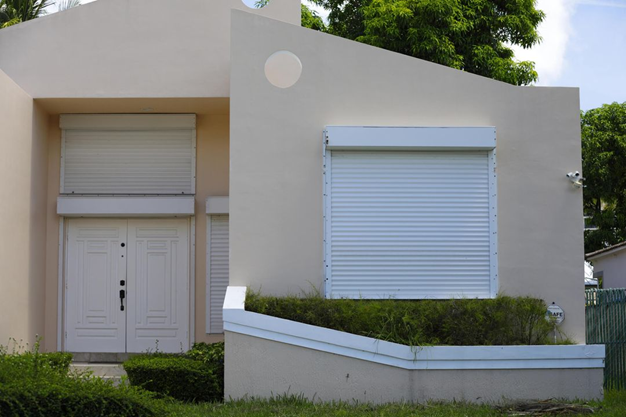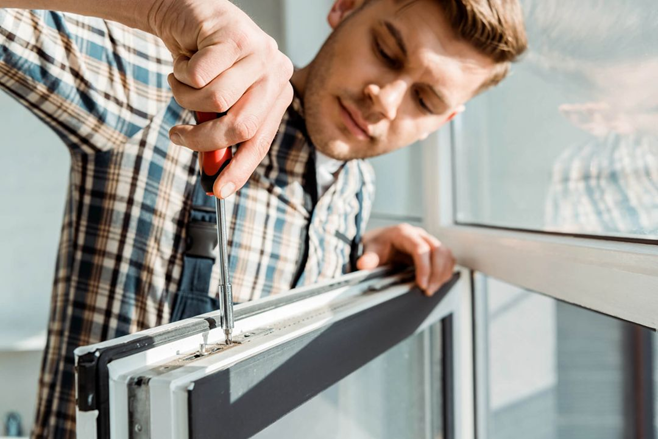Blog
Castle Impact Windows Doors & Shutters

How do you best protect your home during hurricane season? The decision between hurricane doors in FL and traditional storm shutters is important. Both options provide essential protection, but each has its benefits. Knowing these differences is crucial in choosing the best solution for your home. The Key Differences: Hurricane Doors vs. Storm Shutters Hurricane doors and storm shutters are designed to protect against severe weather. However, they differ in installation, maintenance, and overall performance. Ease of Use Hurricane Doors: These doors are a permanent fixture, requiring no preparation when a storm is approaching. They’re always in place, providing constant protection without the setup hassle. Storm Shutters: Shutters must be deployed manually or electronically before a storm, adding extra work and stress. If shutters aren’t properly maintained, they can become difficult to operate when needed most. Durability and Long-Term Value Hurricane Doors: Built from impact-resistant materials like laminated glass and reinforced frames, these doors offer year-round protection from severe weather and break-ins. Their durability ensures a longer lifespan with minimal maintenance. Storm Shutters: While effective, shutters can deteriorate over time due to exposure, requiring more frequent upkeep and repairs. Metal shutters are prone to rust, and rolling shutters can malfunction. Safety and Home Aesthetics Hurricane Doors: Beyond storm protection, hurricane doors enhance security by acting as a barrier against intruders. They also allow natural light, maintaining the home’s appearance and functionality. Storm Shutters: Shutters can make homes feel closed off, blocking light and visibility. They also provide less impact resistance than doors specifically designed to handle debris at high speeds. Are You Considering Hurricane Doors in FL? When considering hurricane doors in FL, the decision often comes down to convenience, durability, and safety. Doors provide comprehensive, hassle-free protection, making them a superior choice for many homeowners. Are you interested in upgrading to hurricane doors? Contact Castle Impact Windows today for expert advice and installation options tailored to your needs!

Homeowners have different options for protecting their homes from storms. Understanding the differences between hurricane shutters, impact windows, and storm panels is important in choosing the best home option. Let's compare these options, focusing on hurricane shutters in Broward County. Comparing Hurricane Shutters to Other Options Hurricane Shutters Benefits of Hurricane Shutters: Hurricane shutters are popular due to their effectiveness and affordability. They provide robust protection against flying debris and strong winds. They are relatively easy to install and can be customized to fit various window sizes and shapes. Installation and Maintenance: Installation of hurricane shutters is straightforward, often requiring professional help for a secure fit. Once installed, they require minimal maintenance, mostly involving occasional cleaning and lubrication of moving parts. Cost Considerations: Hurricane shutters are generally more affordable compared to impact windows. They offer a cost-effective solution for homeowners looking for reliable storm protection without a significant investment. Impact Windows Superior Protection and Aesthetic Appeal: Impact windows provide excellent protection. They are built to withstand strong winds and flying debris without breaking. You don't need to manually install them before a storm, and they maintain your home's attractive appearance because they look like regular windows. Higher Initial Investment: The primary drawback of impact windows is their higher initial cost. However, they can add value to your home and may result in insurance premium reductions, offsetting some of the initial expenses. Energy Efficiency and Noise Reduction: Impact windows offer benefits beyond storm protection, such as improved energy efficiency and noise reduction, making them a valuable investment for home improvement. Storm Panels Temporary and Removable Solution: Storm panels are a temporary solution that can be installed before a storm and removed afterward. They provide strong protection and are relatively inexpensive. Storage and Installation Effort: One downside is the storage space required when the panels are not in use. Installation can be labor-intensive, as each panel must be manually placed and secured before a storm. Versatility and Coverage: Storm panels are versatile and can cover a variety of openings, including windows, doors, and patios. They are a good option for homeowners seeking a flexible, cost-effective storm protection solution. installing Hurricane Shutters in Broward County Are You Considering Hurricane Shutters in Broward County? Choosing the right storm protection involves weighing the benefits and costs of each option. For effective and affordable protection, consider hurricane shutters in Broward County. For expert advice and installation, contact Castle Impact Windows today and ensure your home is well-protected against severe weather.

Hurricane shutters are a reliable choice when protecting your home from severe weather. Installing hurricane shutters in Jupiter, FL, involves several key steps to ensure your home is well-protected. Understanding the process can help you prepare and know what to expect from start to finish. Hurricane Shutters Installation Process Initial Consultation and Assessment On-Site Evaluation: A professional will visit your home to assess your needs. They'll examine your windows and doors, discuss your preferences, and suggest the best hurricane shutters for your situation. Detailed Proposal and Estimate: After the assessment, you'll receive a detailed proposal outlining the recommended shutters, installation process, and cost estimate. This step ensures you understand the scope of work and the investment required. Custom Measurements: Accurate measurements are crucial for a perfect fit. Technicians will precisely measure all openings to ensure the shutters are custom-made to fit your home. Manufacturing and Installation Fabrication: Once measurements are taken, the shutters are custom-fabricated to match your home’s specifications. Depending on the complexity and volume of orders, this process may take a few weeks. Professional Installation: On the scheduled installation day, a team of experts will install the shutters. They’ll ensure each shutter is securely fastened and operates correctly. The installation process is thorough, aiming for both functionality and aesthetic appeal. Quality Check and Demonstration: After installation, the team will perform a quality check to ensure everything is in place and functioning. They’ll also demonstrate how to use and maintain your new hurricane shutters. Final Walkthrough and Customer Support Final Walkthrough: A final walkthrough with the installer ensures all shutters are correctly installed and you are satisfied with the work. This is the time to ask final questions. Post-Installation Support: Some installers offer ongoing support and maintenance tips. They’ll make themselves available to assist with future needs or adjustments. Are You Looking for Top-Quality Hurricane Shutters in Jupiter, FL? Installing hurricane shutters in Jupiter, FL, is straightforward when working with professionals. From the initial consultation to the final walkthrough, Castle Impact Windows ensures a seamless experience. For expert installation and high-quality hurricane shutters, contact Castle Impact Windows today.

When safeguarding their homes with hurricane shutters in Palm Beach County, homeowners often choose between temporary and permanent options. Both types offer distinct advantages and drawbacks, and understanding these can help them make an informed decision tailored to their needs and preferences. Temporary vs. Permanent Hurricane Shutters Pros and Cons of Temporary Hurricane Shutters Flexibility and Cost-Effectiveness: Temporary hurricane shutters, such as storm panel shutters, are typically more affordable and can be stored away when unused. This flexibility allows homeowners to deploy them only when necessary, saving space and reducing visual clutter. Installation and Removal Effort: While cost-effective, temporary shutters require installation and removal for each storm event, which can be labor-intensive and time-consuming. Homeowners must plan ahead and have the necessary tools and help to install these shutters effectively. Durability and Longevity: Temporary shutters can be less durable over time, especially if not stored properly. Repeated handling and exposure to elements can degrade their quality, necessitating more frequent replacements than permanent options. Pros and Cons of Permanent Hurricane Shutters Convenience and Readiness: Permanent hurricane shutters, such as accordion or rolling shutters, offer the convenience of being always ready for use. They can be deployed quickly and easily, providing peace of mind and ensuring your home is protected with minimal effort. Aesthetic Integration: These shutters are designed to blend seamlessly with your home’s architecture, adding to the overall aesthetic appeal. Options like Bahama and colonial shutters enhance your home’s appearance while providing robust protection. Higher Initial Investment: Permanent shutters generally involve a higher upfront cost due to their materials and installation. However, their durability and long-term performance can make them a more cost-effective solution. Choosing the Best Hurricane Shutters in Palm Beach County for Your Home When deciding between temporary and permanent hurricane shutters in Palm Beach County, consider your budget, the frequency of storms, and the level of convenience you desire. Temporary shutters may be suitable for those seeking a budget-friendly solution with flexibility, while permanent shutters offer long-term peace of mind and ease of use. Both temporary and permanent hurricane shutters have their unique benefits and drawbacks. Your choice should align with your specific needs and lifestyle. For expert advice and professional installation, contact Castle Impact Windows today and ensure your home is well-protected against the next storm.

Choosing the right hurricane windows in Boca Raton is crucial for protection and aesthetic appeal. Single- and double-hung hurricane windows each offer unique benefits and drawbacks. Understanding these can help you decide which type best suits your Boca Raton home, considering the local climate and common architectural styles. Comparing Single- and Double-Hung Windows Benefits of Single-Hung Hurricane Windows Energy Efficiency: Single-hung windows provide excellent energy efficiency by minimizing air leakage, thanks to their stationary top sash. This makes them a great choice for maintaining a consistent indoor temperature in Boca Raton's warm climate. Space-Saving Design: Their design maximizes space, making them ideal for high-traffic areas and bedrooms where you want to save every inch possible. This feature is particularly beneficial for homes with compact layouts. Ease of Use: Single-hung windows are simple to operate, with just the bottom sash moving up and down. This simplicity can appeal to homeowners seeking low-maintenance window options. Benefits of Double-Hung Hurricane Windows Enhanced Ventilation: Double-hung windows open both the top and bottom sashes, providing superior ventilation. This can be a significant advantage in Boca Raton's humid climate, promoting better air circulation. Cleaning Convenience: The sashes on double-hung windows tilt inward, making them easy to clean from inside the home. This feature is especially useful for multi-story houses where exterior cleaning can be challenging. Versatility and Comfort: Double-hung windows fit well with various architectural styles. Their design also enhances comfort by allowing better airflow control, which is important during the hot and humid months in Boca Raton. Deciding Which Is Best for Your Home When deciding between single- and double-hung hurricane windows, consider factors like energy efficiency, ventilation needs, ease of maintenance, and your home's design. Single-hung windows may suit smaller, more compact spaces, while double-hung windows offer greater flexibility and convenience for larger homes or those looking to maximize airflow. Depending on your specific needs and home characteristics, you can choose between single- and double-hung hurricane windows in Boca Raton. Both options offer significant benefits, from energy efficiency to enhanced ventilation. For personalized advice and professional installation, contact Castle Impact Windows today to explore the best hurricane window solutions for your home.
Hurricane windows are primarily known for protecting homes from the severe impacts of storms and hurricanes. However, their benefits extend far beyond just storm protection. Understanding these additional advantages can help homeowners considering hurricane windows in Jupiter make an informed decision. Let’s explore how these windows enhance your home beyond storm safety. Additional Benefits Hurricane Windows Offer Enhanced Security Against Break-Ins One of the most significant benefits of hurricane windows is the enhanced security they provide against break-ins. The impact-resistant glass used in these windows is incredibly tough, making it difficult for intruders to break through. This added layer of security gives homeowners peace of mind, knowing their home is better protected from potential burglaries. Unlike standard windows, hurricane windows can withstand multiple impacts without shattering, making it a strong deterrent to intruders. Improved Energy Efficiency Hurricane windows also contribute to improved energy efficiency. Their construction includes multiple layers of glass and a special interlayer that provides excellent insulation. This design helps maintain a consistent indoor temperature, reducing the reliance on heating and cooling systems. As a result, homeowners can significantly reduce their energy bills. In a place like Jupiter, where temperatures can vary, energy-efficient windows make a noticeable difference in comfort and cost savings. Noise Reduction and Soundproofing Another often overlooked benefit of hurricane windows is their ability to reduce outside noise. The thick, laminated glass in these windows is an effective sound barrier, making them ideal for homes in noisy areas. Whether it's traffic, loud neighbors, or construction noise, hurricane windows can help create a quieter, more serene indoor environment. This feature is especially beneficial for those who value a peaceful home setting, contributing to a better quality of life. Are You Considering Hurricane Windows in Jupiter? Hurricane windows offer more than just protection against storms. They enhance home security, improve energy efficiency, and significantly reduce noise. For homeowners in Jupiter, these additional benefits make hurricane windows a valuable investment.

Installing hurricane windows is crucial in protecting your home from severe weather. If you’re considering hurricane windows in Florida, understanding the installation process can help you prepare and ensure everything goes smoothly. We’ll walk you through what to expect before, during, and after the installation of hurricane windows. Hurricane Windows in Florida What Happens Before, During, and After the Installation Process? Pre-Installation Preparation Before the installation begins, there are several preparatory steps to ensure a successful process. First, a professional will thoroughly inspect your home to assess the specific needs and measurements for your new windows. This step is essential to ensure a proper fit and to identify any potential issues that might need addressing beforehand. Once the assessment is complete, you will select the type and style of hurricane windows that best suit your home and budget. Your chosen contractor will then order the windows, and a timeline for the installation will be set. It’s also important to prepare your home by removing any window treatments, furniture, or items near the windows to provide clear access for the installers. The Installation Day On the day of installation, a professional team will arrive at your home with the necessary tools and materials. The first step is to remove the old windows without damaging the surrounding structures. Once the old windows are out, the team will clean and prepare the opening for the new hurricane windows. The new windows will be carefully fitted, ensuring they are level and secure. The installers will seal the windows to prevent air and water leaks, using high-quality sealants and insulation materials. This process is critical to ensure the windows perform effectively during a storm. After the windows are installed, the team will clean up debris and ensure your home is in good condition. Post-Installation Care After installation, it’s essential to follow any maintenance and care instructions provided by the installers to ensure the longevity and performance of your new hurricane windows. Regular inspections and cleaning will help keep your windows in top condition and ready to withstand the next storm. Are You Planning to Install Hurricane Windows in Florida? Understanding the process of installing hurricane windows can help you prepare and ensure a smooth experience. From pre-installation preparation to post-installation care, knowing what to expect makes the entire process less daunting. Are you ready to install hurricane windows in Florida? Contact Castle Impact Windows today to schedule your consultation and protect your home with the best hurricane windows.

Installing new impact doors in Boca Raton can significantly enhance your home’s security, energy efficiency, and storm resistance. This step-by-step guide outlines what to expect during installation, ensuring you’re well-prepared and the project is completed smoothly. A Closer Looking at the Installation Process Preparation and Initial Assessment Site Inspection: Before installation begins, a professional will visit your home to assess the site. This inspection is crucial to identify any structural challenges and take precise measurements. It ensures the new doors fit perfectly, avoiding any future problems with alignment or sealing. Choosing the Right Doors: Select doors that match your home’s architectural style and meet local building codes for wind resistance. Consider factors like material, design, and energy efficiency ratings. This decision is crucial in areas like Boca Raton, where weather conditions demand robust protection. Scheduling the Installation: Coordinate with the installation team for a suitable date. Ensure you have a clear understanding of the timeline and any preparations you need to make, such as clearing the area or securing pets. The Installation Process Removing Old Doors: The team will carefully remove existing doors. This step must be handled carefully to prevent damage to the structural frame and surrounding areas. Installing New Impact Doors: Installers will fit the new doors to ensure they’re level and anchored. This involves precise work to ensure all seals are airtight and operational mechanisms function smoothly. Finishing Touches: After installing the doors, final adjustments are made to ensure optimal performance. This includes testing the locking mechanisms and making any necessary alignments. Post-Installation Cleanup and Final Inspection: The installation team will clean up the work area, removing old doors and installation debris. A final inspection will ensure everything meets your satisfaction and that the doors function as expected. Review Maintenance and Care Tips: It’s best to understand how to maintain and care for your new impact doors. The team should provide tips on how to keep the doors in top condition and information on warranties or services that are available. Do You Want to Install Impact Doors in Boca Raton? Are you ready to upgrade to new impact doors? Contact Castle Impact Windows today for expert installation services and top-quality products tailored to your needs.
Are you looking for the right hurricane shutters in Vero Beach? Shutters should do more than protect your home from severe weather. They should also make your home look better. This guide will help you choose shutters that are both useful and appealing. Selecting the Right Style Material Matters The material of the hurricane shutters you choose plays a crucial role in appearance and durability. Aluminum shutters offer a sleek, modern look and resist rust, while wood shutters add a classic, warm touch to your home's exterior. Color Coordination Color is a powerful tool for making shutters a part of your home's design rather than just an add-on. Most shutters come in a variety of colors. Selecting a hue that complements your home’s exterior can create a cohesive look. Custom Designs For those seeking a unique touch, custom-designed shutters can align precisely with your architectural details. Whether it's a specific pattern or a shape that echoes elements of your home, custom shutters can greatly enhance the overall aesthetic. Find the Right Hurricane Shutters in FL! Integrating hurricane shutters into your home design is a smart move for safety and style. They protect against severe weather while enhancing your home’s exterior. Moreover, choosing shutters that reflect your style is important, but never at the expense of their protective qualities. Make sure that the shutters you select meet local safety standards and can withstand the conditions typically experienced in your area. For a selection that combines the best protection and design, consider exploring the options available at Castle Impact Windows. We’re here to help you find shutters that complement your home beautifully. Contact us today!
If you live in coastal areas prone to hurricanes, you’ll want to take specific measures to protect your home or business from extreme weather. One of the most important steps you can take is to install impact doors in Fort Lauderdale. These doors add to the look of your property and provide robust protection against the powerful forces of nature that come with coastal storms. Benefits of Using Impact Doors in Coastal Areas Enhanced Protection Against Storms Impact doors are built to endure strong winds and flying debris from hurricanes and tropical storms. They‘re designed with reinforced materials and construction that prevent them from breaking or being penetrated, which are common weaknesses in standard doors. These doors help maintain the structural stability of buildings during storms, reducing the risk of significant damage and potential injuries. Improved Energy Efficiency Apart from their resilience, impact doors help seal homes against the extreme weather conditions typical in coastal areas. Their design includes features that minimize air leakage, which can significantly improve a home's energy efficiency. Since this feature can help maintain comfortable indoor temperatures without relying too much on air conditioning, it lowers energy bills and reduces environmental impact. Insurance and Property Value Benefits Impact doors can offer financial benefits. Installing these doors can reduce insurance premiums offered by many insurance companies. Homes fitted with hurricane-resistant features like impact doors can also increase their property value because the doors improve security, energy efficiency, and aesthetics. Consequently, they’re a wise investment for homeowners. Are You Considering Impact Doors in Fort Lauderdale? Impact doors are a must-have for those living in coastal areas. They play a crucial role in providing home safety by protecting against weather conditions, improving energy efficiency, and offering financial benefits. These doors are essential for anyone who owns coastal property. Are you ready to safeguard your home with high-quality impact doors? Contact Castle Impact Windows today to explore our wide range of durable and stylish impact doors designed to withstand even the toughest storms

Share On: